Sharon Salzberg, Rick Hanson, Richard Davidson, and more! – Mindfulness-Based Contemplative Psychotherapy: A 9-month advanced certificate training
$299.00 Original price was: $299.00.$74.00Current price is: $74.00.
Digital Download: You will receive a download link via your order email
Should you have any questions, please contact us: [email protected]
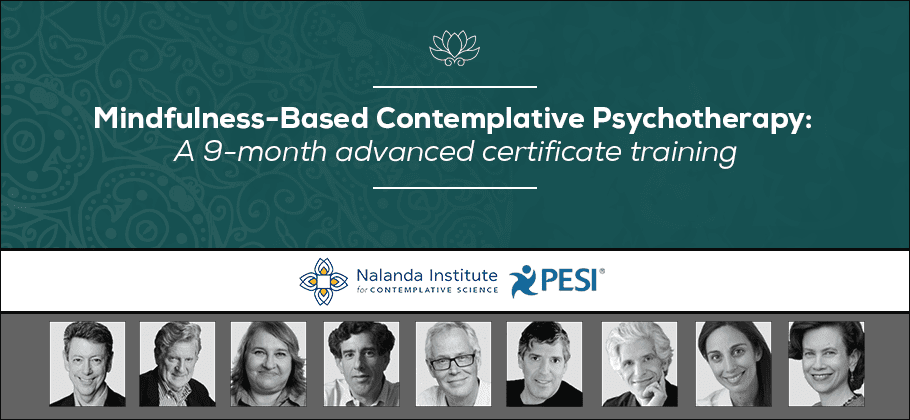 Sharon Salzberg, Rick Hanson, Richard Davidson, and more! – Mindfulness-Based Contemplative Psychotherapy: A 9-month advanced certificate training
Sharon Salzberg, Rick Hanson, Richard Davidson, and more! – Mindfulness-Based Contemplative Psychotherapy: A 9-month advanced certificate training
The Nalanda Institute’s Mindfulness-Based Contemplative Psychotherapy program is the world’s most advanced training for clinicians looking to expand their practice by integrating a variety of mindfulness-based meditation practices with Buddhist psychology, contemporary psychotherapy, and current neuropsychology.
Now, for the first time ever, you can earn your Certificate in Mindfulness-Based Contemplative Psychotherapy from the Nalanda Institute through online access to their comprehensive training.
This intensive 9-month certificate training program will help distinguish you as a leader in the field of Mindfulness-Based Contemplative Psychotherapy among your clients, employer and fellow clinicians.
Co-developed by Nalanda Institute core faculty, Joe Loizzo, M.D., Ph.D., Miles Neale, PsyD, and Emily Wolf, Ph.D., the training program includes the world’s leading experts and provides you direct access to the work and lessons of the most sought-after teachers, including:
- Sharon Salzberg, acclaimed author and prominent Buddhist meditation teacher
- Rick Hanson, Ph.D., New York Times best-selling author and authority on self-directed neuroplasticity
- Richard Davidson, Ph.D., groundbreaking researcher and one of Time Magazine’s “100 Most Influential People in the World”
- Chris Germer, Ph.D., author, international speaker and co-developer with Kristen Neff of the Mindful Self-Compassion program
- Jeffrey Rubin, Ph.D., critically acclaimed author and creator of meditative psychotherapy
- Robert Thurman, Ph.D., recognized worldwide authority on religion, spirituality and Buddhist science
- …and more
This groundbreaking training will show you how to masterfully weave insights and practices from contemplative psychology into the daily fabric of your clinical practice — providing you a powerful approach that can help improve clinical outcomes in clients experiencing trauma, anxiety, depression, pain, addiction and more.
Don’t wait to become one of tomorrow’s leaders… Join an elite group of your peers who are transforming their practice and their clients’ lives by earning their certificate in mindfulness-based contemplative psychotherapy.
By joining us to
Earn your Certificate in Mindfulness-Based Contemplative Psychotherapy,
you will:
 Learn to combine a safe, exploratory dialog with time-tested practical skills to illuminate your clients’ potential for healing and happiness
Learn to combine a safe, exploratory dialog with time-tested practical skills to illuminate your clients’ potential for healing and happiness Develop essential skills for helping clients apply Mindfulness to daily life
Develop essential skills for helping clients apply Mindfulness to daily life Receive ongoing support from group members and Nalanda Institute Staff throughout the 9-month training
Receive ongoing support from group members and Nalanda Institute Staff throughout the 9-month training Participate in two peer-reviewed teach-back meditations to empower you in delivering effective instruction
Participate in two peer-reviewed teach-back meditations to empower you in delivering effective instruction Complete a Capstone Project to showcase your new skills and understanding of mindfulness-based psychotherapy
Complete a Capstone Project to showcase your new skills and understanding of mindfulness-based psychotherapy Join an elite group of peers from around the globe, all focused on enhancing their therapeutic skills and improving client outcomes
Join an elite group of peers from around the globe, all focused on enhancing their therapeutic skills and improving client outcomesProgram Features
- 9-Months of weekly meditations, classes, and presentations from leading experts
- Supplemental readings to help deepen your understanding of the weekly teachings
- Online video lecture you can view at your own convenience from the comfort of your home or office
- Guided meditations that show you how to enhance introspection, develop awareness, cultivate positive emotions and evoke insight
- Q&A calls with Nalanda faculty to share additional insights
- Two interactive teach-back opportunities to practice meditation leading skills and receive peer feedback
- Self-designed Capstone Project to showcase your application of the advanced training
What Will I learn?
This 9-month training program provides a comprehensive foundation for integrating contemplative psychology and meditation practice into contemporary psychodynamic, cognitive-behavioral, object relation, interpersonal, family-systems therapies and related care giving fields. You’ll learn how to use mindfulness-based psychotherapy to combine safe, exploratory dialog with time-tested practical skills and age-old contemplative insights aimed at embodying your clients’ innate potential for healing and happiness.

Learn key insights from one of the world’s oldest surviving psychologies to help you understand the nature of the mind, assess symptoms, determine etiologies and prognosis and offer effective treatment in a manner unlike any contemporary system.
You’ll hear lecture and participate in meditations led by today’s leaders in meditation and contemplative science:
- Sharon Salzberg, the most prominent Buddhist meditation teacher in the West and acclaimed author
- Joe Loizzo, M.D., Ph.D., Nalanda Institute Founder, Harvard-trained psychiatrist and Columbia-trained Buddhist scholar with over forty years’ experience studying the beneficial effects of contemplative practices on healing, learning and development
- Miles Neale, PsyD, one of the leading voices of the current generation of Buddhist teachers and a forerunner in the emerging field of contemplative psychotherapy
- Emily Wolf, Ph.D., director of the Nalanda Institute’s Contemplative Psychotherapy Program and private practice clinician focused on integrating contemplative methods into Western psychodynamic therapy

Go beyond simple versions of mindfulness into the depth and sophistication of its original method of mediation prescribed in contemplative science.
Let the Nalanda faculty show you how much more value there is for your clients beyond mainstream presentations. You’ll enjoy lectures from guest faculty including:
- Robert Thurman, Ph.D., recognized worldwide authority on religion and spirituality, Asian history, world philosophy, Buddhist science, Indo-Tibetan Buddhism, and His Holiness the Dalai Lama
- Ethan Nichtern, Buddhist teacher, author, and activist who has lectured at Brown, Wesleyan, Yale, NYU, and Antioch
- …and more

See how neuroscience can inform why, how and what mindfulness-based techniques can help your clients engage in healthier behaviors while improving their emotional regulation, concentration, and ability to restructure unhelpful thoughts.
You’ll gain the knowledge you need to inform your practice from today’s leading voices in the field of neuroscience and research, including:
- Rick Hanson, Ph.D., psychologist, teacher, New York Times best-selling author
- and authority on self-directed neuroplasticity
- Richard Davidson, Ph.D., groundbreaking researcher and one of Time Magazine’s “100 Most Influential People in the World”
- Sonia Sequiera, Ph.D., neuroscientist and researcher focused on how meditation can be used to improve health in diverse populations
- …and more

Examine the many ways that mindfulness practices have been effectively applied in clinical context to help clients manage stress, reduce addictions and anxiety, prevent depressive relapse, and facilitate insight, self-compassion, affect regulation, secure attachment and behavior modification.
Discover how you can apply Mindfulness Based Therapies (such as MBSR, MBCT, and MBRP), Acceptance and Commitment Therapy, Dialectical Behavioral Therapy, and more from leading clinicians such as:
- Erin Olivio, Ph.D, clinical psychologist in private practice, former Assistant Clinical Professor of Medical Psychology at Columbia University, and the former Director of the Columbia Integrative Medicine Program
- Jon Kaplan, Ph.D., clinical psychologist that serves as the director of the SoHo CBT + Mindfulness Center, which specializes in providing innovative cognitive behavioral therapy and mindfulness training for adults, teens, children, couples, and organizations
- Bart van Melik, M.A., a meditation and Insight Dialogue teacher focused on working with diverse populations, including bringing meditation to juvenile detention centers, homeless shelters, VA hospitals and New York City public schools
- Leslie Blackhall, M.D., Associate Professor of Medicine and Medical Humanities at the University Of Virginia School of Medicine and Director of Palliative Care Services
- …and more

Review a variety of ways experts have thoughtfully integrated Buddhist psychological insights and mindfulness practices into their own clinical work so you too can be well informed about how to effectively apply these methods into your own treatment with confidence.
Get the insight you need to tackle the toughest clinical cases from experts including:
- Paul Fulton, Ph.D., a clinical psychologist, lecturer in Psychology at the Department of Psychiatry of Harvard Medical School at Cambridge Health Alliance, and board member/co-founder of the Institute for Meditation and Psychotherapy
- Chris Germer, Ph.D., author, international speaker and co-developer with Kristen Neff of the Mindful Self-Compassion program
- Jeffrey Rubin, Ph.D., critically acclaimed author and creator of meditative psychotherapy
- Pilar Jennings, Ph.D., psychoanalyst, author and researcher at the Columbia University Center for Study of Science and Religion where she explores the intergenerational transmission of trauma
- …and more
How is the program organized?
During the 9-month certificate training, you will engage in:
- 36 weeks of comprehensive online video training — an in-depth curriculum designed by the Nalanda Institute and taught by a faculty of leading scholars, practitioners, world-class meditation teachers, pioneering mindfulness and compassion researchers, and renowned clinicians.
- Supplemental readings to help deepen your understanding of the weekly teachings.
- Peer-reviewed projects — get two unique opportunities to practice teaching meditation and receive feedback from your fellow peers within the course.
- Capstone Project — to showcase your course learning as it relates to your field of practice.
- Q&A sessions with Nalanda Institute faculty — to hear additional insight in applying contemplative psychotherapy to your practice.

Week 1 | Four Foundations of Mindfulness Meditation
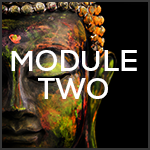
Week 2 | Four Noble Truths: Foundations of Buddhist Psychology
Week 3 | Introduction to Contemplative Psychotherapy: Defining Mental Illness and Optimal Health in Classic Buddhist Psychology
Week 4 | Buddhism: Historical and Philosophical Developments**
Week 5 | Mind and Mental Factors: The Basic Mind Science of Buddhist Psychology
Week 6 | Karma: Psychological Causality within the Context of Dependent Origination
Week 7 | Freedom and Clarity of Mind: Natural strategies to help clients find relief
Week 8 | Selflessness**
Week 9 | The Eightfold Path and Three Disciplines: Comprehensive treatment strategies informed by Buddhist psychology
Week 10 | Introduction to the Capstone Project and Meditation Teach-backs**
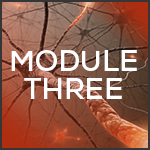
Week 11 | Neuropsychology and Contemplative Practice as it Relates to Stress and Trauma
Week 12 | Limbic system and attachment: Resonance, Regulation, and the Mammal Brain
Week 13 | Neuroscience of Awakening: The clinical application of self-regulatory practices
Week 14 | Neuroscience of Compassion: Clinical Applications for compassion-based meditation strategies
Week 15 | First Guided Meditation Teach-back Opportunity**
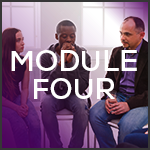
Week 16 | Mindfulness Based Therapies: MBSR, MBCT, MBRP
Week 17| Acceptance and Commitment Therapy
Week 18 | Treatment of Personality Disorders and DBT
Week 19 | Mindfulness and Self-Compassion Based Couples and Family Therapy
Week 20 | Mindfulness for Youth at Risk**
Week 21 | Living, Dying and the Problem with Hope
Week 22 | Mindfulness in Trauma Treatment
Week 23 | Second Guided Meditation Opportunity**

Week 24 | Attachment, Mindfulness and Psychotherapy
Week 25 | Meditation Teaching Methodology, Review**
Week 26 | Mindfulness Practice as Advanced Training for the Clinician
Week 27 | Loving-kindness Meditation**
Week 28 | Self-compassion and Psychotherapy**
Week 29 | Meditative Therapy
Week 30 | Opportunity to Develop Your final Capstone Project.**
Week 31 | Practicing Meditative Therapy
Week 32 | Healing the Selfless Self / Working with Transference and Countertransference
Week 33 | Intersubjectivity and Interpersonal Dynamics in Buddhism and Psychotherapy
Week 34 | Spiritual Bypassing
Week 35 | The Love of Space: Mindful Caregiving and the Ethics of Presence
Week 36 | Capstone Project Presentation**
Featuring today’s leaders in Contemplative Science…

Sharon Salzberg is one of the most prominent Buddhist meditation teachers in the West and has been teaching and leading meditation retreats around the world for over three decades. Her writings have appeared in numerous publications, including Time, Yoga Journal, Tricycle, Buddhadharma, Lion’s Roar, and numerous anthologies.
Speaker Disclosure: Financial: Sharon Salzberg is a co-founder of the Insight Meditation Society. She is an author for multiple publishers and receives royalties. Ms. Salzberg receives a royalty from PESI, Inc. Non-financial: Sharon Salzberg has no relevant non-financial relationship to disclose.

Rick Hanson, Ph.D., is a psychologist, teacher, and New York Times best-selling author. Dr. Hanson is a co-founder of the Wellspring Institute for Neuroscience and Contemplative Wisdom and is a Senior Fellow of the Greater Good Science Center at UC Berkeley. An authority on self-directed neuroplasticity, his books include Buddha’s Brain: The Practical Neuroscience of Happiness, Love, and Wisdom, Hardwiring Happiness: The New Brain Science of Contentment, Calm, and Confidence, and Just One Thing: Developing a Buddha Brain One Simple Practice at a Time.
Speaker Disclosure: Financial: Rick Hanson is in private practice. He receives a speaking honorarium from PESI, Inc. Non-financial: Rick Hanson has no relevant non-financial relationship to disclose.

Richard Davidson, Ph.D., is a neuroscientist and received his doctorate from Harvard University. He is professor of psychology and psychiatry at the University of Wisconsin–Madison, as well as Founder and Director of the Center for Healthy Minds. Dr. Davidson has published hundreds of scientific papers and is the author of The Emotional Life of Your Brain and Altered Traits: Science Reveals How Meditation Changes Your Mind, Brain, and Body (co-written with Daniel Goleman). Best known for his groundbreaking work studying emotion and the brain, his current research is broadly focused on the neural bases of emotion and emotional style as well as methods to promote human flourishing, including meditation and related contemplative practices.
Speaker Disclosure: Financial: Richard Davidson is a professor at the University of Wisconsin. He receives an honorarium from the University of Washington. Dr. Davidson is an author for Avery Publishing and receives royalties. Dr. Davidson is the recipient of grants from the National Institute of Health; and the Silicon Valley Community Fund. He receives a royalty from PESI, Inc. Non-financial: Richard Davidson is a member of the American Psychological Association; Healthy Minds Innovations, LLC; and the Mind and Life Institute.

Robert Thurman, Ph.D., is a recognized worldwide authority on religion and spirituality, Asian history, world philosophy, Buddhist science, Indo-Tibetan Buddhism, and His Holiness the Dalai Lama. He is the Jey Tsong Khapa Professor of Indo-Tibetan Buddhist Studies in the Department of Religion at Columbia University, President of the Tibet House U.S., Spiritual Director of Menla, and President of the American Institute of Buddhist Studies. Dr. Thurman received his Ph.D. from Harvard and has studied extensively with many top Tibetan Lamas including His Holiness the Dalai Lama. Dr. Thurman is the author of many books, including The Central Philosophy of Tibet, The Jewel Tree of Tibet, and, most recently, with William Meyers and Michael Burbank, Man of Peace: The Illustrated Life Story of the Dalai Lama of Tibet.

Christopher Germer, Ph.D., is a clinical psychologist, a lecturer on psychiatry (part-time) at Harvard Medical School, and travels extensively leading workshops on mindfulness and self-compassion. He received his doctorate in clinical psychology from Temple University. Dr. Germer is the author of The Mindful Path to Self-Compassion and co-editor of Mindfulness and Psychotherapy, and Wisdom and Compassion in Psychotherapy. Currently, he is co-developer (with Kristin Neff) of the Mindful Self-Compassion (MSC) training program and actively engaged in research and training teachers of MSC.
Speaker Disclosure: Financial: Christopher Germer is in private practice. He receives a speaking honorarium from PESI, Inc. Non-financial: Christopher Germer is a member of the American Psychological Association; and the Association for Behavioral and Cognitive Therapies.

Jeffrey B. Rubin, Ph.D., is an author, meditation teacher, and a psychotherapist in private practice. He is a graduate of Princeton University, Columbia University and Union Institute. Dr. Rubin is a sensei in the Rinzai Zen lineage and the “creator of meditative psychotherapy.” He is also a training and supervising analyst at the Westchester Institute for Training in Psychoanalysis and Psychotherapy. Among the books that he has authored are The Art of Flourishing: A New East-West Approach to Staying Sane, Finding Love in an Insane World and Meditative Psychotherapy: The Marriage of East and West.
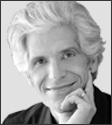
Joseph (Joe) Loizzo, MD, Ph.D., is a Harvard-trained psychiatrist and Columbia-trained Buddhist scholar with over forty years’ experience studying the beneficial effects of contemplative practices on healing, learning and development. He is Assistant Professor of Clinical Psychiatry in Integrative Medicine at Weill Cornell Medical College, where he researches and teaches contemplative self-healing and optimal health. He has taught the philosophy of science and religion, the scientific study of contemplative states, and the Indo-Tibetan mind and health sciences at Columbia University, where he is Adjunct Assistant Professor at the Columbia Center for Buddhist Studies.
Sale Page: https://catalog.pesi.com/sales/bh_c_001248_nalanda_organic-27253
Archive: https://archive.fo/HkdHw

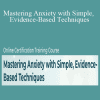
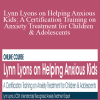
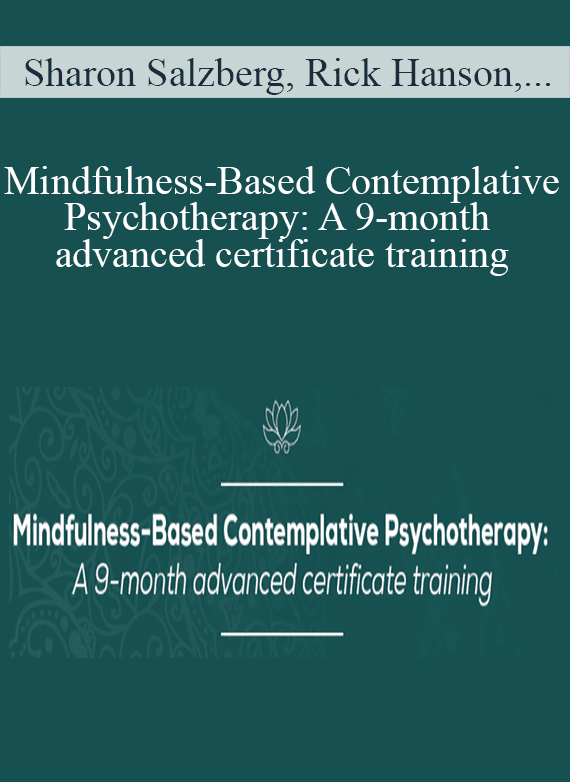
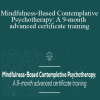
Reviews
There are no reviews yet.